HAPPY NEW YEAR
I hope the best wishes to you
Questions
- Simple questions
- Interrogative adverbs ("how?", "when", "why?", etc.)
- Interrogative pronouns ("who", "whom", "what", etc.)
- "Which", "which one"
Simple questions
Simple questions (that is, questions to which one can respond by a simple "yes" or "no") may be formed in three different ways:
1. "Do": one precedes an assertion with "do" or "does" (or "don"t" or "doesn"t" for a negative expression, or "did", "didn"t" for the past):
- Do you want to go to the movies?
- Does she work at IBM?
- Don"t you travel quite a bit?
- Do they answer questions quickly?
- Didn"t they want to eat?
But: One never places "do" or "does" before the verb "to be" or before modal verbs in questions; in this case it is preferable to invert the subject and verb:
- Are you coming to the reception?
- Was the meeting boring?
- Weren"t you hungry?
2. Inversion: with certain verbs (especially the verbs "to be", "to do", "to have", and modal verbs) questions are formed by inverting the subject and . (In the case of the verb "to have," which is usually combined with "do" in
1. متین آئینی 44.4 2. میثاق احمدیاری46.6
3. پویا بدره کردی 87.7 4. عدنان برزنجی 43.3
5. سروش بهمنی68.8 6. مازیار پرویزی56.6
7. فرزین حیدری 67.7 8. احمد خاطری 77.7
9. دیاکو خورشیدی 77.7 10. چیا رمضانی 86.6
11. رضا زارعی 60 12. مهیمن زارعی55.5
13. رضا زاهدی 73.3 14. رزگار سلیمی 56.6
15. آروین شاهمرادی 60 16. رائف شیخ احمدی 77.7
17. سپهر شیخی 72.2 18. یاسین صلواتی 35.5
19. پارسا طعامی67.7 20. دانیال عبدی 46.6
21. رضا فائز 61.1 22. نوید فیاضی61.1
23. سامان کوهی 40 24. آروین گلشنی 60
25. نوید محمدی 37.7 26. سبحان مرادی 77.7
27. دیلان مرادسلیمی 56.6 28. رامیار مردوخی 92.2
29. احمد منبری 72.2 30. بصیر نگهدار 28.8
31. نیما نوری 54.4
1. مصعب احمدی 62.2 2. پارسا اصطفائی 42.2
3.امیررضا اقبالی 56.6 4. مهیار بابائی 30
5. یاسین بدری 27.7 6. پدرام برازی 43.3
7. عمر بهمنی 40 8. فربد تیمورپور 74.4
9. پویا جلیلی 24.4 10. پوریا حیدری 81.1
11. کامیار رابطی 62.2 12. محمد رحیمی فر91.1
13.آرین رضانیا 45.5 14. مبین زندی43.3
15. علی صیفی 45.5 6.مرصاد غلام ویسی 95.5
17.سعدی فتحی 55.5 18. کارین فرهادی نیا 17.7
19. اسماعیل قدمی 82.2 20. محمد قطبی 44.4
21. مبین قوامی 61.1 22. مهران کامران پور 36.6
23.سینا کرباسچی 68.8 24. احمد گلینی 26.6
25.حسین مرادپور 64.4 26. یاسر مرادی 53.3
27.نوید مندمی 62.2 28 . آرمان میهمی 77.7
29. علیرضا ناصرآبادی 55.5 30. ادیب نصرتی 60
31. مبین نعمتی 60 32. شکیب وزیری61.1
Lonely Sky
That cold north wind they call “La Bise”
Is swirling ‘round about by knees
Trees are crying leaves into the river
I’m huddled in this French café
I never though I’d see the day
But winter’s here and summer’s really over
Even the birds have packed up and gone
They’re flying South with their song
And my love, she too has gone, she had to fly
Nouns
Gender
In English nouns rarely change form, even to indicate gender. As a general rule, only nouns referring to people and some animals reflect gender in their form. By the same token, unlike many other languages, the adjectives modifying nouns will remain unchanged.
Example:
- My poor little dog died.
However, certain nouns — especially those referring to people – may have different forms to indicate masculin or feminine usage:
- man — woman
- gentleman — lady
- actor — actress
- uncle — aunt
- father — mother
The same can be said of certain male and female animals:
Woman Dies in House Fire
An 80-year-old woman died Tuesday afternoon in a fire. The blaze was reported about 2:30 p.m. at a home on Sunnyside Avenue. The victim was identified as Mary Cass. Her husband, Roy Cass, 80, was not at home at the time of the fire. Investigators from the local fire department were trying to determine the exact cause of the fire. They said it looked like the woman had fallen asleep on the sofa with a cigarette in her hand.
The value of the home was estimated at $700,000. The Casses were married in 1945. Both of them had been smokers throughout most of their lives.
Mr. Cass said, “Six months ago, we decided to quit smoking, because we wanted to live to be 100. So we went to a smoking cessation clinic. The clinic worked! We both managed to quit a month ago. At least I thought we both did. I can"t believe she was smoking behind my back.”
In the Garage
Garages are small buildings used to park or store automobiles. A garage can be a separate building or it can be attached to a house. Usually the garage is on one side of the house, but sometimes it is behind the house. Garages are used for many things in addition to storing automobiles. Some men have a work bench and tools in their garages where they go to repair broken items from the home, fix toys, build bird houses or avoid their wives. Other people store seasonal items in their garages: lawnmowers, rakes, sleds, wagons, bicycles, barbecue grills and so on. Some people store so many other things in their garage that there is no room for their car.
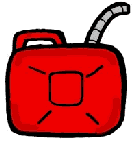 |
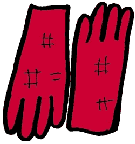 |
 |
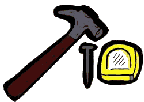 |
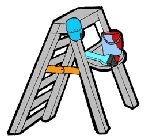 |
| This is a special can used for storing gasoline. | Work gloves are often kept in the garage. | This is a hacksaw and is used for cutting metal. | You can often find a hammer, nails and a tape measure in a garage. | People use a step ladder to reach high places for painting, changing light bulbs, etc. |
Some garages are small, just large enough for one car with enough room on either side for the car doors to open. Other garages have enough room for two or three cars in them. Sometimes a garage will have a room or small apartment above the parking area. This extra living space can be used as an office, a workshop, a guest room or a bedroom for one of the children in the family. Older garages often had wide doors that swung open to the side or slid sideways on tracks to allow cars to get in or out. Most newer garages have overhead doors that lift up and slide back along metal guide rails. These overhead doors can be operated by muscle power or by electric motors. Many electric doors are raised or lowered by pushing a button on a little gadget that looks like a television remote control. These gadgets are called "garage door openers," of course.
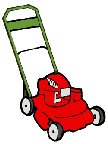 |
 |
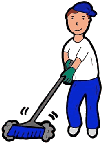 |
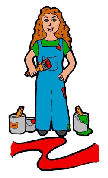 |
 |
| Lawnmowers are often stored in the garage when they are not being used. | This is a paint roller, used for spreading paint on flat surfaces. | Sam is sweeping the garage with a push broom. | Sally is painting the floor and herself. | A wood saw is used for cutting boards. |
The little road that leads from the street to the garage is called a driveway. A driveway can be paved with concrete or macadam ("blacktop"), covered with gravel, or may just be a path worn through the grass. Finally, a "garage sale" is not an occasion for buying a garage at a low price. This is another term for a "yard sale" or a "porch sale," but which takes place in a garage, instead. A family tries to sell all of the old furniture, appliances, unwanted gifts, out-grown clothing and odds and ends that had been accumulating for years to some other family that doesn"t have enough old stuff yet. This can also be called "redistribution of wealth" at the neighborhood level.
 |
 |
 |
 |
 |
| Many mothers make their sons keep their skateboards in the garage. | Snow shovels and garden spades are often stored in the garage. | A staple gun uses spring power to drive staples into wood. | An open-end wrench is a useful tool for mechanics. | Thumbtacks are used to hold light items to wood or to bulletin boards. |

Past progressive
The past progressive is a past tense which emphasizes the ongoing nature of the action described. It is formed by using the auxiliary "to be" with the present participle:
- I was working.
- He was eating his dinner when the phone rang.
- The cat was meowing last night while we tried to sleep.
Normally, if an idea could be expressed with the expression "was in the process of doing" or with "was in the midst of doing," the past progressive will be more appropriate than the simple past. Consequently, verbs indicating belief, emotion, possession, etc., are rarely conjugated in the past progressive:
- I thought that was right. ["I was in the process of thinking..." would be awkward.]
- Cheryl owned her own house. ["Cheryl was in the midst of owning..." would be awkward.]
Note: Do not use the past progressive in order to describe habitual actions in the past.




